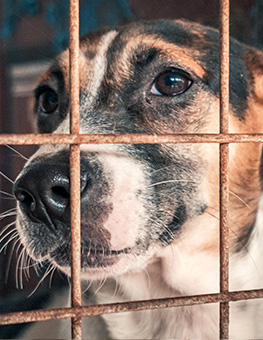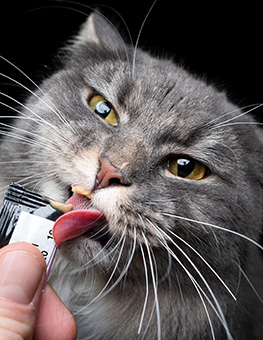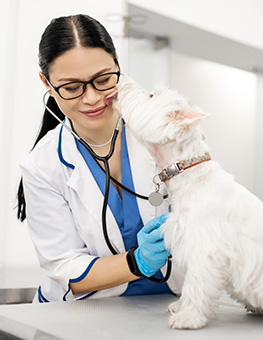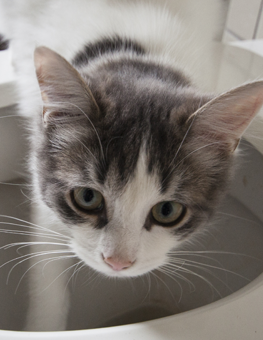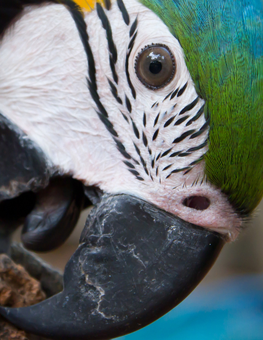Everything You Need to Know About Intestinal Parasites in Cats and Dogs
Intestinal parasites in cats and dogs affect your pet in many ways, from mild discomfort and irritation to causing life-threatening conditions. Like external parasites, such as fleas, ticks, lice and mites, intestinal parasites can transmit disease to humans. Learn how to help keep your pet healthy.
While external parasites, like fleas and ticks, are easy for pet parents to spot and identify, intestinal parasites can be present inside your cat or dog without obvious signs.
Roundworms, hookworms, tapeworm, whipworms, Coccidia, and Giardia are all common parasites seen in dogs and cats, especially those that are strays. While cats and dogs of any age can become infected by ingesting eggs or larval versions of parasites found in their environment, (as well as by eating birds or rodents) puppies and kittens are the biggest victims, as they can be infected by their mother through the placenta or from her milk.
- Roundworms: Roundworms are the most common intestinal parasite in cats and dogs. Adults typically reach 2-6 inches long. While they migrate throughout the body, roundworms primarily thrive off food in the intestinal tract of their host. Eggs are shed by female worms in the stool, and ingestion of those eggs is how an animal becomes infected. Roundworms can be eliminated by most de-wormers, but repeat doses are usually necessary. Human infection is possible if the eggs are ingested. Practicing good hygiene can greatly reduce you and your family’s risk of contracting roundworms.
- Hookworms: Hookworms are another common parasite in pets. Adult worms are very small and thin, therefore making them often unnoticed in the stool in comparison to roundworms. These worms “hook” into the lining of the intestines and feed off the host’s blood. Eggs are shed by female worms in the stool, but the eggs quickly hatch to become larvae. These larvae can infect other animals, including people by being eaten or penetrating through bare skin.
- Whipworms: Whipworms are small, thin worms with an even thinner tail that resembles a whip. They burrow their tail into the lining of the large intestine, causing irritation and diarrhea. Eggs are shed by female worms, but not continuously, which means testing for them can be difficult. Whipworm eggs can live in the environment for months at a time.
- Tapeworms: Tapeworms are usually diagnosed by actually seeing rice-grain segments around an animal’s rectum. Tapeworms live off food in the intestines. Pets get tapeworms by eating an intermediate host like a mouse or flea.
- Coccidia: Coccidia are microscopic organisms called protozoa that live in the lining of the gut and can cause diarrhea. They are shed as cysts and are ingested to re-infect animals.
- Giardia: Giardia is an intestinal parasite that lives in moist environments, especially ones where there is standing water. Giardia can cause vomiting and diarrhea. They are also shed as cysts into the environment and are ingested to re-infect animals. People can also be infected if they should ingest contaminated water or food.
Many pets with parasites don’t show symptoms until the infection has become severe, though tapeworms and roundworms can typically be spotted immediately in your cat or dog’s stool. Sometimes when pets contract parasites, their diagnosis unnoticed because the signs are nonspecific, meaning they could be linked to many different health problems.
The most common signs of intestinal parasites are diarrhea, vomiting, weight loss, lethargy, swollen stomach and dull coat. Veterinarians most frequently perform fecal examinations to determine if worms or other parasites are present.
While many pets can be carriers of intestinal parasites without symptoms, others are disposed to becoming very sick. Luckily, intestinal parasites are easy to treat and prevent, though you don’t want to wait until your pet is infected to take action. Heartworm medications can treat most stages of worms and usually contain general de-wormers.
Good hygiene is crucial to prevent infection in your pet as well as your family. Always pick up and properly dispose of your pet’s stool.
Make an appointment with your vet to make a comprehensive parasite prevention plan.

